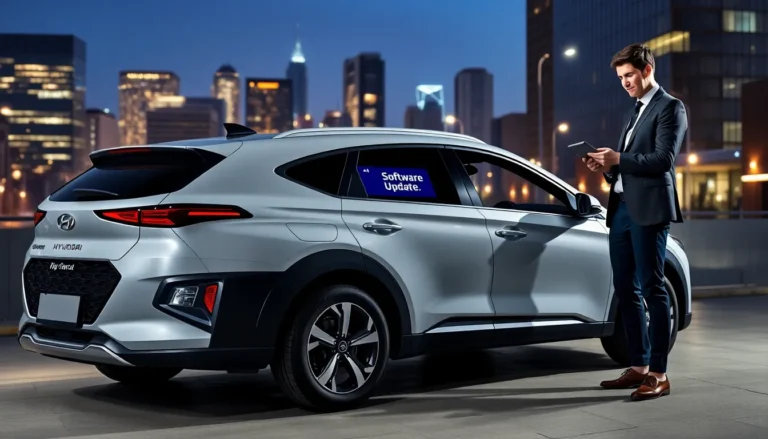Table of Contents
ToggleImagine waking up to a world where everything is at your fingertips, from ordering breakfast to checking your health stats, sounds like a sci-fi movie, right? Welcome to the reality of technology. It’s not just about flashy gadgets and gizmos: technology now shapes our lives in subtle but powerful ways. Daily routines have been transformed by technological marvels, making life easier, more connected, and sometimes even a bit quirky. Let’s jump into 10 of the most significant ways technology influences our everyday lives and makes it easier to communicate, learn, and thrive.
Communication: Connecting People Across Distances

In the past, communicating with someone far away meant writing letters, sending pigeons, or, in extreme cases, hiring a magician. But, technology has completely changed that narrative. Today, we have instant messaging apps, video calls, and social networking platforms that bridge the gap between continents. Whether it’s a quick chat with a friend across the globe or a video conference for work, technology allows for real-time interaction, breaking down barriers that once felt insurmountable. With the advent of platforms like WhatsApp, Zoom, and Slack, the world feels a little smaller.
Education: Enhancing Learning Experiences
Gone are the days when education was confined to classrooms. Technology has revolutionized learning, opening a wealth of resources with just a few clicks. Online courses, e-books, and educational apps play a significant role in enhancing the learning experience. Students can now learn from top educators worldwide at their own pace. Virtual classrooms have also made education accessible to people in remote areas, eliminating geographical barriers. Imagine mastering a new language from a native speaker while lounging in your pajamas, thank you, technology.
Healthcare: Revolutionizing Patient Care
Healthcare is another field benefiting immensely from technology. With telemedicine, patients can now consult doctors from the comfort of their homes. Wearable health devices like smartwatches track vital signs and alert users about potential health issues. Besides, telehealth has been a game-changer, especially during pandemics, allowing patients to receive care without risking exposure. Enhanced data management and AI diagnostics are also pushing the boundaries of what’s possible in patient care, making healthcare not only safer but also more efficient.
Transportation: Improving Mobility and Safety
Transportation has undergone a massive transformation thanks to technology. With navigation apps like Google Maps, people can find the fastest routes, avoid traffic, and learn about delays in real time. Ride-sharing services like Uber and Lyft have changed how we travel, providing convenient options without the need for traditional taxis. Also, advancements in electric and autonomous vehicles promise to make transportation not just easier but also more environmentally friendly, steering us toward a sustainable future.
Entertainment: Transforming Leisure Activities
When it comes to entertainment, technology is the life of the party. Streaming services like Netflix and Spotify have redefined how we consume media. Instead of waiting for a weekly episode, you can binge an entire season in one go. Video games have also evolved into immersive experiences, and virtual reality takes it a step further, allowing players to jump into alternate worlds. This revolution in entertainment means that people can access personalized content tailored to their interests anytime, anywhere.
Finance: Simplifying Transactions and Budgeting
Managing finances used to involve stacks of paperwork and countless trips to the bank. Technology has simplified personal finance through apps that allow for budgeting, monitoring expenses, and even investing directly from the palm of your hand. Mobile banking has made it possible to transfer money, pay bills, and check balances from anywhere. Also, cryptocurrency and blockchain technology are opening new doors, prompting discussions about the future of finance and its implications.
Home Automation: Increasing Convenience and Efficiency
Home automation is rapidly becoming a staple in many households. Smart devices can control lighting, temperature, and security systems, all through voice commands or smartphone apps. Imagine adjusting your home’s ambiance without lifting a finger or receiving real-time alerts when someone enters your property. Thermostats like Nest learn your habits and optimize energy consumption, while smart speakers assist with daily tasks like setting reminders or playing your favorite tunes. The result? A cozier, more efficient home.
Workplace: Boosting Productivity and Collaboration
Technology has transformed the workplace, making it more collaborative and efficient. Tools like Slack, Microsoft Teams, and Asana help teams communicate seamlessly, regardless of location. Remote work has exploded, allowing employees to work from anywhere with internet access. Besides, cloud technology enables easy sharing of documents, enhancing collaboration. Productivity tools automate repetitive tasks, leaving more time for creativity and innovation. This shift means companies can attract and retain talent, offering a healthier work-life balance.
Social Media: Shaping Interaction and Community
Social media platforms like Facebook, Twitter, and Instagram have revolutionized how people interact. They allow individuals to connect with friends and family, share life updates, and join communities based on shared interests. But, while social media can foster connection, it also poses challenges such as misinformation and privacy concerns. Even though the pitfalls, these platforms remain powerful tools for activism, marketing, and building relationships.
Environmental Sustainability: Promoting Eco-Friendly Practices
Finally, technology plays a crucial role in promoting environmental sustainability. Innovations in renewable energy, like solar and wind, are making it possible to harness natural resources more efficiently. Smart grids optimize electricity usage, while apps that track carbon footprints help individuals and businesses make greener choices. Technology improves recycling processes and encourages sustainable practices, advocating for a healthier planet for future generations.




